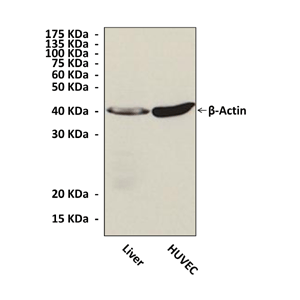Product Sheet CC10028
Description
BACKGROUND Actin is a ubiquitous globular protein that is one of the most highly-conserved proteins known. It is found in two main states; G-actin is the globular monomeric form, whereas F-actin forms helical polymers. Both G- and F-actin are intrinsically flexible structures - a feature vital in actin\'s role as a dynamic filament network.
Actin has four major functions. Firstly, F-actin polymers form microfilaments - polar intracellular \'tracks\' for kinesin motor proteins, allowing the transport of vesicles, organelles and other cargo. Actin is a component of the cytoskeleton and links to alpha-actinin, E-cadherin and beta-catenin at adherens junctions. This gives mechanical support to cells and attaches them to each other and the extracellular matrix. In muscle cells, actin-rich thin filaments associate with myosin-rich thick filaments to form actomyosin myofibrils. Using energy from the hydrolysis of ATP, myofibrils undergo cyclic shortening through actin-myosin head interactions, which represents the mechanics of muscle contraction. Finally, actin has a role in cell motility through polymerization and depolymerization of fibrils.1
Beta actin, also known as cytoplasmic actin is a 42 kDa, highly conserved protein, ubiquitously expressed in all eukaryotic cells. It is a relatively stable cytoskeletal protein normally at a constant level in cells, regardless of experimental treatment or technical procedure.2 For this reason, measurement of beta-Actin is generally used as an internal control for experimental error.
Actin has four major functions. Firstly, F-actin polymers form microfilaments - polar intracellular \'tracks\' for kinesin motor proteins, allowing the transport of vesicles, organelles and other cargo. Actin is a component of the cytoskeleton and links to alpha-actinin, E-cadherin and beta-catenin at adherens junctions. This gives mechanical support to cells and attaches them to each other and the extracellular matrix. In muscle cells, actin-rich thin filaments associate with myosin-rich thick filaments to form actomyosin myofibrils. Using energy from the hydrolysis of ATP, myofibrils undergo cyclic shortening through actin-myosin head interactions, which represents the mechanics of muscle contraction. Finally, actin has a role in cell motility through polymerization and depolymerization of fibrils.1
Beta actin, also known as cytoplasmic actin is a 42 kDa, highly conserved protein, ubiquitously expressed in all eukaryotic cells. It is a relatively stable cytoskeletal protein normally at a constant level in cells, regardless of experimental treatment or technical procedure.2 For this reason, measurement of beta-Actin is generally used as an internal control for experimental error.
REFERENCES
1. Pollard, D.T. & Cooper, J.A.: Science 326:1208-1212, 2009
2. Mori, R. et al: Prostate 68:1555-60, 2008
2. Mori, R. et al: Prostate 68:1555-60, 2008
Products are for research use only. They are not intended for human, animal, or diagnostic applications.
Details
Cat.No.: | CC10028 |
Antigen: | Raised against a short peptide from human beta-Actin sequence. |
Isotype: | Mouse IgG1 |
Species & predicted species cross- reactivity ( ): | Human, Mouse, Rat |
Applications & Suggested starting dilutions:* | WB 1:1000 IP n/d IHC n/d ICC n/d FACS n/d |
Predicted Molecular Weight of protein: | 42 kDa |
Specificity/Sensitivity: | Detects endogenous beta-actin proteins without cross-reactivity with other family members. |
Storage: | Store at -20°C, 4°C for frequent use. Avoid repeated freeze-thaw cycles. |
*Optimal working dilutions must be determined by end user.
Products
| Product | Size | CAT.# | Price | Quantity |
|---|---|---|---|---|
| Mouse Beta-Actin Antibody: Beta-Actin Mouse Monoclonal Antibody | Size: 100 ul | CAT.#: CC10028 | Price: $302.00 |

